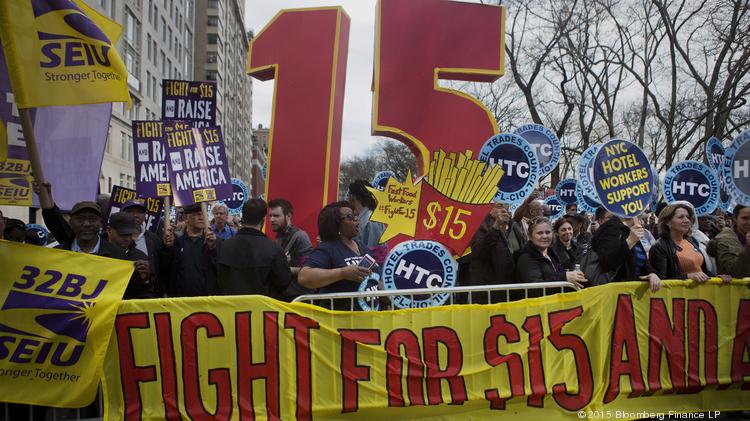Photo: Victor J. Blue / Bloomberg
Minimum Wage Increase Effects on the Restaurant Industry
At a time when minimum wage in the United States varied from $5.15 in Wyoming, to $9.15 in Connecticut, and with the Federal wage set at $7.25, New York made history when they raised their minimum wage to $15.00 (source: NCSL). While the plan will phase in over three years in New York City, and over six years in the rest of the state, the reaction was quick. While many in the media hailed the decision as being something that’s been needed for years, there were just as many naysayers. They claimed that raising the minimum wage would stunt the economy, as restaurants, especially locally owned ones, would struggle to meet payroll once the new minimum wage rates began.
Following in the footsteps of New York, other cities such as Seattle and a handful of California municipalities including Los Angeles, San Francisco, Oakland, and Berkeley have also approved the new wage to be phased in over a few years. (source: US News). While many, most notably those who work in the food service industry, have been clamoring for this change for some time, there are some who feel that a spike in pay this high will have an adverse effect on the economy, and the food service itself. While no one disagrees that the pay rates in the food service industry are some of the lowest in America, many consider it to be unskilled labor.
Some fast food companies have already started taking measures to lower costs in their restaurants. Some have installed self-serve drink fountains or computer style kiosks that allow customers to tap in their order and pay. Their order is then transmitted wirelessly to monitors in the kitchen. These moves are effectively making front counter workers unneeded. Another hope with the raise of the minimum wage is less employee turnover. It is thought that the turnover rate will drop with the increase in wages, thus absorbing some of the cost for the restaurant industry.
There is a great debate as to whether or not this will boost the economy. More money paid to employees means more money to spend. The higher minimum wage also means that these workers are less likely to rely on food stamps, which will save taxpayer dollars. We’ve all heard of the salaries that CEO’s of large corporations are making, and there are many changes that could be made within corporate-owned and franchise restaurants that will ease the blow to the bottom line. But family-owned restaurants aren’t paying bloated salaries to anyone, so their only option to cover the higher wage is to raise prices on their food. While this is feasible in cities where the minimum wage as a whole is being raised, it will be difficult to carry out in cities where only food service wages are being raised, as raising food prices is likely to have a negative impact on locally-owned restaurants.
While it’s certainly too early to panic, small, non-corporate restaurants need to be looking at strategies to cover the increase in labor costs, both short and long term. Paring menus, changing the type of service that’s offered, or changing to a less expensive location are all possibilities that may need to be investigated.
For assistance in preparing your restaurant for the upcoming wage increase and streamlining your business, contact TRG Restaurant Consulting.






